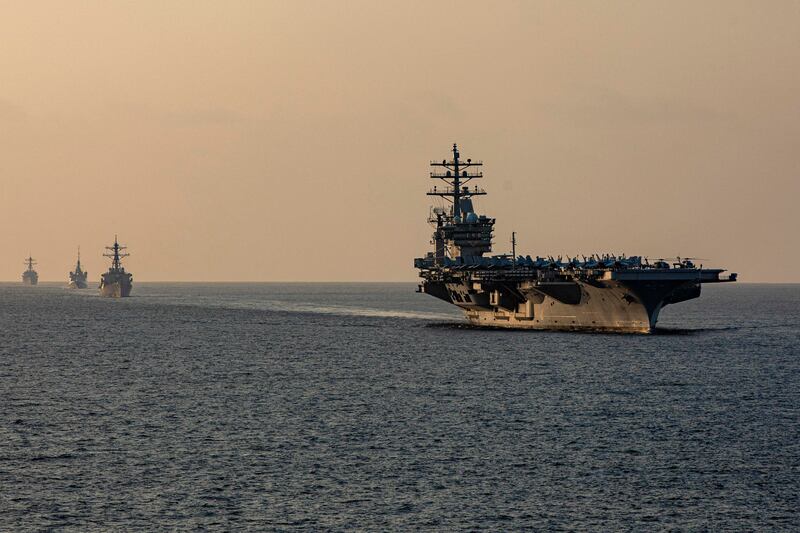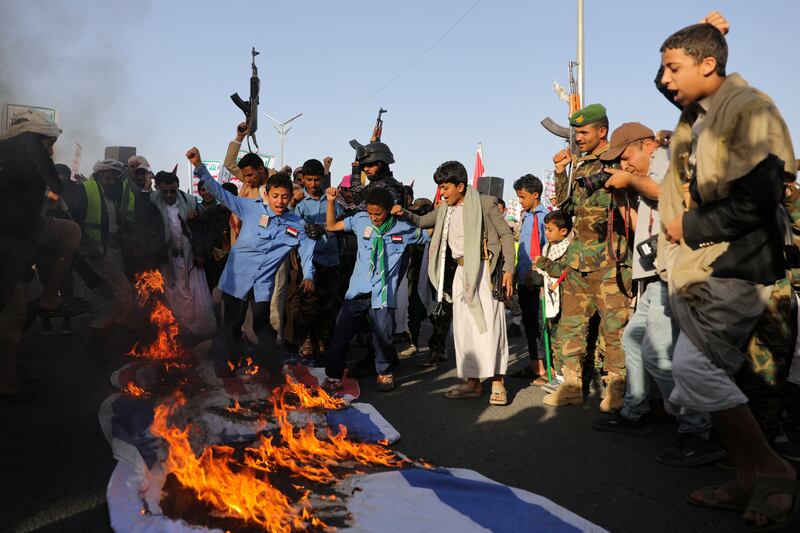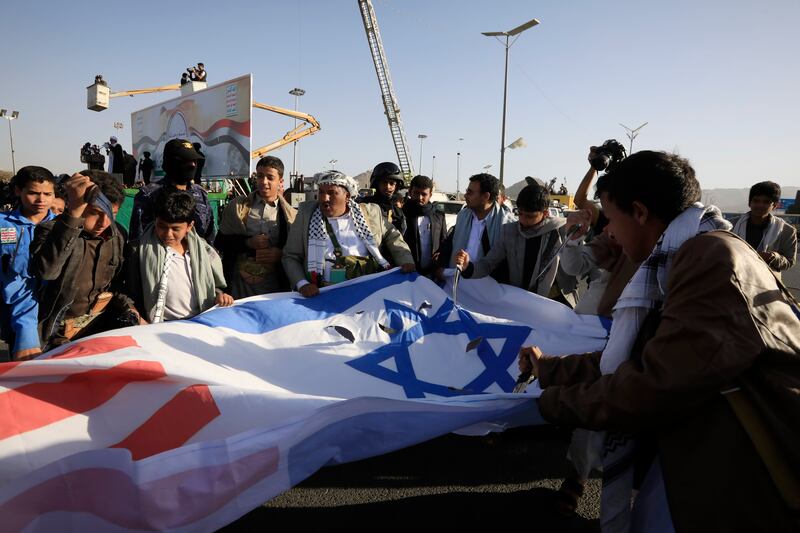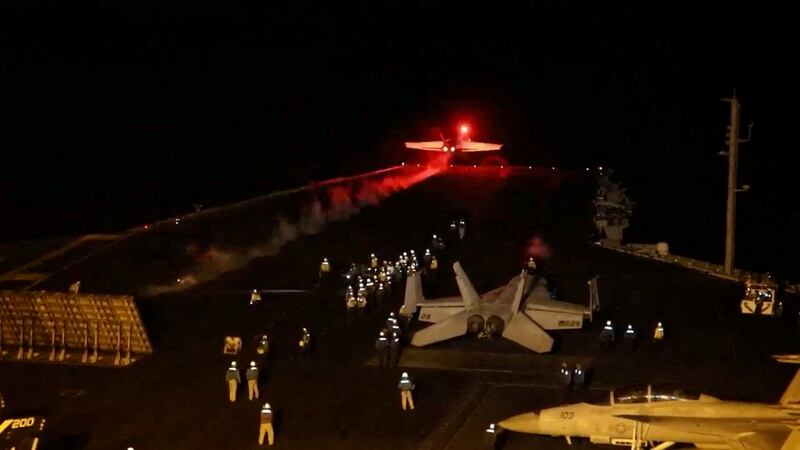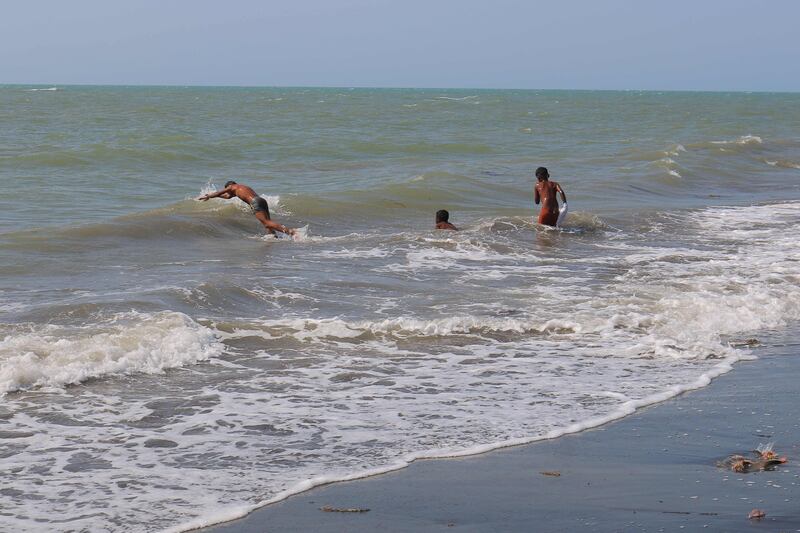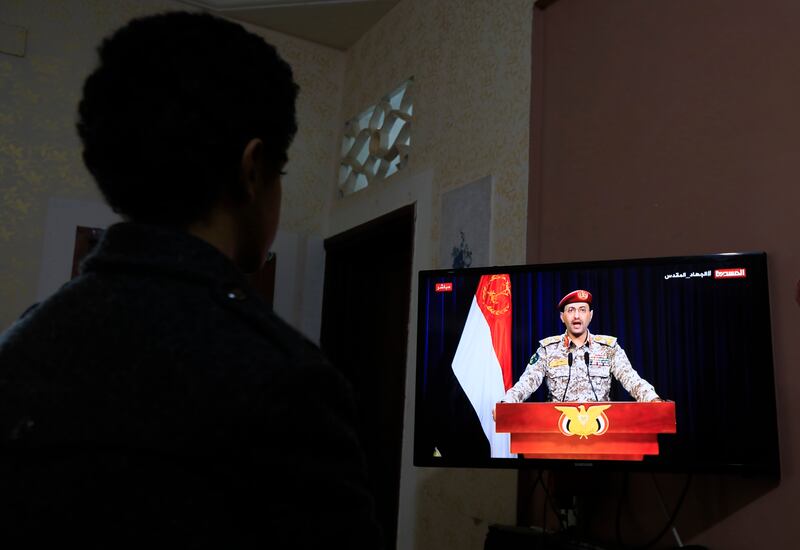Live updates: Follow the latest news on Israel-Gaza
Over the past fortnight, the US military has bombed Houthi positions in Yemen at least nine times, raising fears of the Pentagon moving into yet another protracted Middle East conflict with no obvious way out.
The stated aim for the US, the de facto protector of many international waterways, is to “degrade” Houthi capabilities and stop the Iran-backed rebels from launching drones and missiles at Red Sea shipping in attacks that have already forced cargo vessels to reroute around southern Africa.
Washington has long sought to shift its focus from the Middle East after decades of military involvement in Iraq, Syria and elsewhere.
The situation in Yemen highlights how difficult it will be for the US to remove itself from the region.
US special envoy for Yemen Tim Lenderking told The National that the US would keep doing whatever it takes to thwart the Houthis.
“These strikes are about hitting Houthi capabilities to conduct attacks on shipping, including underground weapons facilities and missiles they’re using to strike commercial, civilian ships,” Mr Lenderking said.
“The attacks must stop. We will continue to do what we must to protect our ships and sailors, as well as the free flow of international commerce.”
The Houthis say they are attacking ships sailing towards, or connected to, Israel as a response to the war in Gaza, which the US is trying to stop spreading into a regional conflict.
But the US-led military strikes do not appear to be changing the Houthis’ intentions, at least for the moment, and the group has pledged to keep attacking ships.
US President Joe Biden last week admitted the strikes were not having a deterrent effect but said they would continue.
Meanwhile, senior members of Congress from both parties are pressing the Biden administration on whether it breached Congressional requirements by launching the strikes without legislative approval.
“There is no current congressional authorisation for offensive US military action against the Houthis,” wrote senators Tim Kaine, Chris Murphy, Todd Young and Mike Lee.
“As tensions in the region rise, we believe that American participation in another war in the Middle East cannot happen in the absence of authorisation by Congress, following an open debate during which the American public can be informed of the benefits, risks and consequences of such conflict.”

Experts say there few easy options for the US when it comes to dealing with the Houthis, whose Red Sea attacks complicate what had been a long-standing US effort to mediate a permanent end to Yemen’s nine-year civil war.
“The US can't just do nothing, especially after it issued stern warnings,” said Michael Knights, a Middle East expert and the Jill and Jay Bernstein fellow at the Washington Institute.
Mr Knights said a “bonus” of the US-led strikes, which the UK assisted on two occasions, is that they will reduce the attack capabilities of the Houthis in the Red Sea, and their ability to target Saudi Arabia or launch precision missile attacks within Yemen.
“We are doing some reasonably useful degradation of the Houthis’ advanced conventional weapons stocks,” he said.
Mr Lenderking said the US priority is to protect its interests in the region, which includes peace in Yemen.
“We would like to preserve the gains from almost two years of truce [in Yemen] and avoid conflict expanding in the Arabian Peninsula,” he said.
Defence Priorities, a Washington think tank that advocates a reduced US military footprint, said a more extensive air campaign against the Houthis would jeopardise the continuing peace talks in Yemen and bolster domestic support for the rebels.
The group said more efforts should be made to solve the crisis through diplomacy, and called on China and the EU to take a greater role in contributing to global security.
Mr Knights said the Houthis had gained “an awful lot” from the attacks on Red Sea shipping by showing a willingness to take on the US.
But he said the Red Sea crisis will probably resolve itself when Israel's assault on Gaza ends, which he predicted would happen within a month.
“It's a pretty good bet that the Houthis, like the rest of the Axis of Resistance, will probably power down when we hit a Gaza reconstruction phase,” he said, referring to the anti-Israeli coalition led by Tehran.
Mr Lenderking repeated that Houthi attacks were “incompatible” with the peace process in Yemen's civil war, but Washington remains committed to maintaining steady progress.
“People need to keep in mind that something very significant happened in the last month, which is the tremendous progress made towards completion of a road map between the Saudis and the Houthis,” he said.
Meanwhile, the UN’s trade and development body on Thursday sounded the alarm over the Houthi attacks on shipping in the Red Sea and their effects on global trade routes.
It estimated the trade volume going through the Suez Canal decreased by 42 per cent over the past two months.
